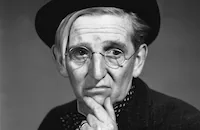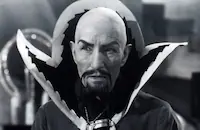The Town Went Wild
Cast & Crew
Ralph Murphy
Freddie Bartholomew
James Lydon
Edward Everett Horton
Tom Tully
Minna Gombel
Film Details
Technical Specs

Synopsis
Next-door neighbors Henry Harrison and Everett Conway have been feuding for twenty years. Despite their fathers' discord, Henry's daughter Carol and Everett's son David have fallen in love. After David, a young engineer, learns that he is being shipped to Alaska for six months to work on a government project, he decides to elope with Carol. When David goes to City Hall to get a copy of his birth certificate to send to Washington, Tweedle, the head of the Bureau of Vital Statistics, makes an amazing discovery which he decides to investigate further. Tweedle instructs David to return later for his birth certificate but does not disclose the reason. After leaving the City Clerk's office, Dave enlists Carol's brother Bob in their plan to elope and delegates him to find a car for their trip to Midvale, the location of the justice of the peace. When homely Millie Walker, who is infatuated with Bob, drives by in her car, David suggests that they all go for a drive that night. Later that evening, as Bob, Millie, David and Carol motor to Midvale, Tweedle knocks at the Conways' door and announces that Bob Harrison and David Conway, who were born on the same day, were switched at the hospital in the midst of an argument between their fathers and consequently, Bob is a Conway and David a Harrison. Meanwhile, in Midvale, the justice of the peace proclaims that David and Carol must wait three days to wed after the issuance of their marriage license and sends them home. When Bob, Carol and David approach their houses, they hear their parents bickering and Carol learns that David may be her brother. As the town eagerly awaits the final decision of the court as to the parentage of the boys, Carol laments that she may be in love with her brother while Bob worries that someone will discover the marriage license, which has been filed at the Midvale City Hall. When court convenes, Tweedle advocates that the boys be returned to their rightful parents. Just then, Irma Reeves, the nurse who attended the birth of the Harrison baby, bursts into the courtroom and attests that she saw a red birthmark on the infant. Judge Bingle then orders a physical exam of the boys, but it is inconclusive because both sport red birthmarks. On Tweedle's testimony, the judge rules that the babies were switched at birth and orders David to move in with the Harrisons and Bob to live with the Conways. As the families attempt to settle into their new roles, David becomes overwrought and collapses with a high fever. Witnessing the incident, Bob rushes into the Harrison house and sends for the doctor, who diagnoses measles and quarantines the household. Bob then produces a law book and informs David and Carol that they can be arrested for applying for a marriage license because they are brother and sister. Panicked, David sends Bob and Carol to ask Judge Bingle for help. The judge instructs them not to tell a soul about their predicament and promises to cancel and destroy the license. Soon after, the justice of the peace from Midvale visits Henry, whom he has discovered is a fellow brother in the Moosehead lodge. After the justice of the peace tells Henry about the marriage license and informs him that it is to be published in the next day's paper, Henry decides to steal the license and returns to Midvale with the justice of the peace. Meanwhile, Bob and Carol return home to tell David the good news about Judge Bingle. Overhearing the conversation, Everett and his wife Lucille and Henry's wife Marian burst into the room and tell them about Henry's plan to steal the license. As Everett, Bob, Carol, Marian and Lucille speed to Midvale to stop Henry, Millie, who has told her father the news, follows and David joins them. Just as Henry breaks into City Hall, the rest of the gang arrives and a loud argument ensues, alerting the night watchman, who arrests Henry, Everett and Walker. Jailed in the same cell, Henry and Everett finally agree on something--they decide to protect their families by refusing to mention the marriage license as their defense. On the day of the trial, David recovers from the measles and hurries to get dressed and join his family in court. As he undresses, he makes a discovery and rushes to tell Judge Bingle. As court convenes, Judge Bingle, accompanied by David and Bob, breaks into the courtroom and declares that the marriage license is legal because she can prove the boys's parentage by the birthmark. After she explains that David's birthmark was really a measle spot, Bob is identified as the true Harrison son, thus freeing Carol and David to marry.

Director
Ralph Murphy
Cast

Freddie Bartholomew

James Lydon

Edward Everett Horton

Tom Tully

Minna Gombel
Jill Browning
Ruth Lee

Maude Eburne

Charles Halton
Ferris Taylor

Jimmy Conlin
Monte Collins
Roberta Smith

Charles Middleton
Emmett Lynn
Dorothy Vaughn
Fred Burton

Will Wright
Crew
Royal Babbitt
William A. Callahan
Gerard Carbonara
David Chudnow
Clarence Greene
Clarence Greene
George Johansen
Karlice
Richard M. Monroe
Thomas Neff
Carl Pierson
Ferol Redd
Bernard R. Roth
Bernard R. Roth
Russell Rouse
Russell Rouse
Charles Stevens
Philip Tannura
Glen P. Thompson
George Van Marter
James H. Wade

Film Details
Technical Specs

Quotes
Trivia
Notes
The film opens with the following written prologue: "In the year 921 BC, Vremus the philosopher said, [A line of written hieroglyphics] and we heartily agree." It closes with the following written epilogue: "So you see, Vremus was right when he said [hieroglyphics]. It is a wise child who knows his own father." Composer Gerard Carbonara's name was misspelled as "Gerrard" in the onscreen credits. This was the first production of agent Bernard Roth and writers Clarence Greene and Russell Rouse. Roth represented Rouse and Greene as well as stars Freddie Bartholomew and James Lydon, according to a Hollywood Reporter news item. Another Hollywood Reporter news item stated that the rushes from the film were so impressive that the shooting schedule was extended from eighteen to thirty days.












